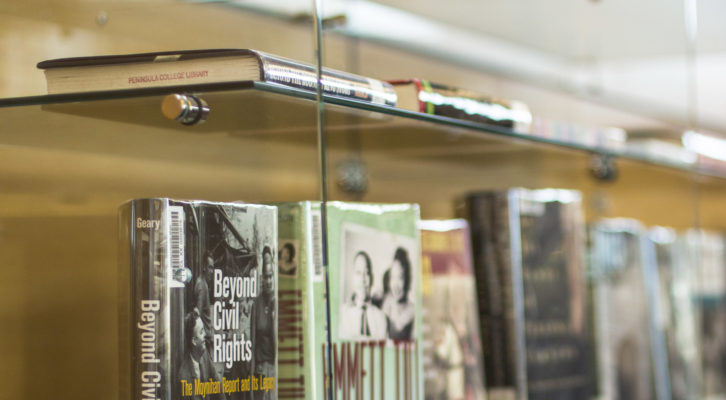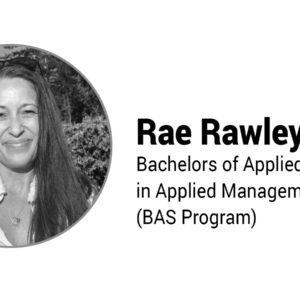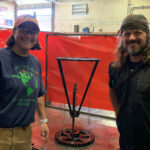When I tell people I’m a librarian I often get a bemused response along the lines of, “Are libraries still a thing?” In an age of 24/7 information access in the palm of your hand, the vision most people have of a library seems outdated. The reading rooms full of books with the green-shaded desk lamps often comes to mind, as does a livelier vision of a place where you can get children’s books for free. However, in a world where information comes to your computer and your phone in overwhelming quantities and you can read more than you ever want to on a topic with just a quick web search, a library can seem old-fashioned.
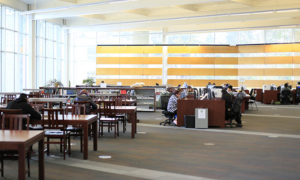 It’s precisely for that reason, however, that libraries are more vital than ever before, especially in an educational environment. With the dramatic and ever-increasing amount of information available to us, we face challenges in determining what’s useful, what’s relevant, what’s even correct. This is where libraries shine. Libraries, and particularly academic libraries, provide users with ample access to curated materials vetted to provide a variety of authentic but fact-based viewpoints. Beyond the books within the library, libraries now provide many online resources such as journals, videos and e-books, and also online tools like reference and citation help via chat. One of my favorite tools at the Peninsula College Library is Pronunciator, an online language learning resource. Beyond getting to revisit the little bit of Czech I learned when I spent some time in Prague in college (Jedno pivo, prosím!), it has a more practical use in helping international students learn English and American students learn their language of choice.
It’s precisely for that reason, however, that libraries are more vital than ever before, especially in an educational environment. With the dramatic and ever-increasing amount of information available to us, we face challenges in determining what’s useful, what’s relevant, what’s even correct. This is where libraries shine. Libraries, and particularly academic libraries, provide users with ample access to curated materials vetted to provide a variety of authentic but fact-based viewpoints. Beyond the books within the library, libraries now provide many online resources such as journals, videos and e-books, and also online tools like reference and citation help via chat. One of my favorite tools at the Peninsula College Library is Pronunciator, an online language learning resource. Beyond getting to revisit the little bit of Czech I learned when I spent some time in Prague in college (Jedno pivo, prosím!), it has a more practical use in helping international students learn English and American students learn their language of choice.
Perhaps the reason that Pronunciator is one of my favorite resources is because I believe, in the words of R. David Lankes, that “libraries are in the conversation business” (2007). The point of a library is not to provide information, it’s to help users construct knowledge out of that information. Sometimes that’s done by reading a book or watching a video, a sort of one-sided conversation, but more often the construction of knowledge comes out of interacting with information, in a more dialectical approach. That’s been the basis of education since Socrates, and libraries are a natural partner in this endeavor. Asking a librarian for information, rather than Google, engages you in a conversation within the scholarly community, and can lead you to the best local resources for constructing knowledge in that community. Libraries make it easier to join the conversation by meeting users where they are in the process, rather than the ‘drink-from-the-fire-hose’ approach of a web search. Students (and others!) who use the library to start these conversations find that the research process is less frustrating and more engaging. Particularly in an age of ‘alternate facts,’ the library is an invaluable part of education and community through fostering conversation to construct knowledge.
Lankes, R. D. (2007). Participatory networks: The library as conversation. Information Technology and Libraries 26(4): 17-33.
About the Author
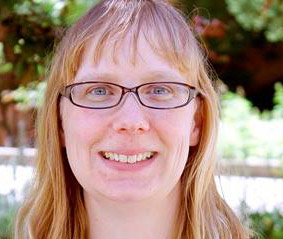 Samantha Hines received her Masters’s degree in library and information science from University of Illinois in 2003 and has worked in a variety of libraries since then. Before arriving at Peninsula College last year, she most recently spent four years as the head of the Missoula College Library, the affiliated two year campus of the University of Montana in Missoula. She is a prolific scholar and frequent conference presenter on issues of library instruction, copyright and publishing, and library management. Outside of a library, you can usually find Samantha at home with her cats and children, or out biking and hiking.
Samantha Hines received her Masters’s degree in library and information science from University of Illinois in 2003 and has worked in a variety of libraries since then. Before arriving at Peninsula College last year, she most recently spent four years as the head of the Missoula College Library, the affiliated two year campus of the University of Montana in Missoula. She is a prolific scholar and frequent conference presenter on issues of library instruction, copyright and publishing, and library management. Outside of a library, you can usually find Samantha at home with her cats and children, or out biking and hiking.

